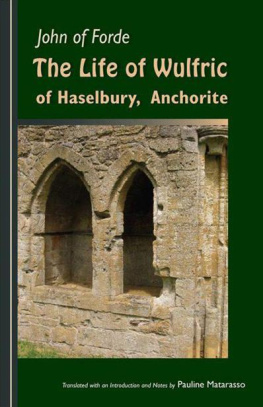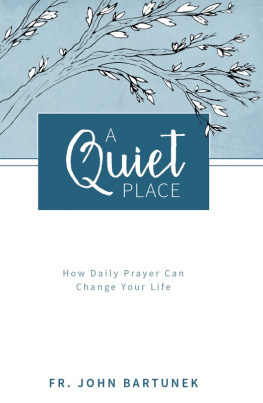CISTERCIAN FATHERS SERIES: NUMBER SEVENTY-NINE
JOHN OF FORDE
The Life of Wulfric of Haselbury, Anchorite
CISTERCIAN FATHERS SERIES: NUMBER SEVENTY-NINE
JOHN OF FORDE
THE LIFE OF WULFRIC OF HASELBURY,
ANCHORITE
Introduction, Translation, and Notes
by
Pauline Matarasso

Cistercian Publications
www.cistercianpublications.org
LITURGICAL PRESS
Collegeville, Minnesota
www.litpress.org
A Cistercian Publications title published by Liturgical Press
Cistercian Publications
Editorial Offices
Abbey of Gethsemani
3642 Monks Road
Trappist, Kentucky 40051
www.cistercianpublications.org
2011 by Order of Saint Benedict, Collegeville, Minnesota. All rights reserved. No part of this book may be reproduced in any form, by print, microfilm, microfiche, mechanical recording, photocopying, translation, or by any other means, known or yet unknown, for any purpose except brief quotations in reviews, without the previous written permission of Liturgical Press, Saint Johns Abbey, PO Box 7500, Collegeville, Minnesota 56321-7500. Printed in the United States of America.

Library of Congress Cataloging-in-Publication Data
John, Abbot of Ford.
[Vita Wulfrici. English] The life of Wulfric of Haselbury, anchorite / John of Forde ;
introduction, translation, and notes by Pauline Matarasso. p. cm. (Cistercian fathers series ; no. 79) Includes bibliographical references (p. ). ISBN 978-0-87907-579-8 ISBN 978-0-87907-799-0 (e-book) 1. Wulfric, Saint, d. 1154. I. Matarasso, Pauline Maud. II. Title. III. Series. BX4700.W85J6413 2011 271.1202dc22 [B]
2010036914
CONTENTS
written by the Venerable John, prior of Forde
ACKNOWLEDGMENTS
I owe much to the support of family, friends, and strangers in the preparation of this book. Particular thanks are due to Professors Christopher Holdsworth, Michael Clanchy, and Christopher N. L. Brooke for pointing me to sources of information which might have escaped me; to Hilary Costello, OCSO, who has been for years my first port of call in all that concerns Wulfric and to whom I owe most of the scriptural references, and to Denis Geoghegan, OCSO, both of Mount Saint Bernard Abbey, for help with textual difficulties; to Alexander Murray, University College, Oxford, whose comments have amended and enriched the introduction; to Dr. Keith Day, who generously placed his transcript of the Cambridge ms. at my disposition prior to the publication of his forthcoming edition; to Catherine Wybourne, OSB, for drawing my attention to the relevance of Saint Benedicts chapter on the cellarer; to Dr. Philip McCosker, who, with unflagging kindness, facilitated access to research materials; and last but far from least, to John Trappes-Lomax, who unravelled with expertise and patience the many linguistic knots I sent his wayto him goes my gratitude, and any mistakes remaining are mine alone.
INTRODUCTION
1. JOHN OF FORDE
There are difficulties in presenting to a readership potentially drawn from a wide spectrum of interests and persuasions a text of which almost every assumption, including the declared intentions of the author, is now subject to question. John of Fordes stated wish was to write something which would glorify God and strengthen and build up (aedificare) the faithful. Over the centuries, through a semantic shift corresponding to an evolution in religious sensibility, the Vita Wulfrici became a work of edification, which is, and is not, somewhat different. The Enlightenment judged it irrational, the Victorians found it unedifying, the modern age categorized it as hagiography, a genre to be approached with caution and a sack of salt. Theologians prefer straight theology, and this has the appearance of a hybrid work, made up of fact worked on by memory and further embroidered with meaning; the theology is there but must be sought. Social historians, dismissing the theology, hunt around in the text like truffle hounds for evidence to lay alongside that of charters, acts, and chronicles. Yet the Cistercian order which John of Forde joined a generation after its foundation acknowledges him today as one of its Fathers and this translation is being published under its aegis. The monks of this age stand by their founders, and I have tried to do the same, standing beside John wherever I could, while maintaining the historical perspective.
It might be thought strange to begin an introduction to a Life with the author rather than the subject, the more so as the author held himself of no importance or interest compared to the subject, and the rest of the world shared that view until quite recently. It is, however, the Life, as a work of biography, hagiography, social history, or art, that is under study, rather than the author or the subject per se. Moreover, almost everything we know about Wulfric of Haselbury comes from John; were it not for the Life, the written record would hold only the name and a miracle story.a It is also true that for centuries little was known about John save that he wrote the Life. His Sermons on the Song of Songs have since come to light, yet the earlier work, with its wider context, is perhaps for a post-modern readership the more revealing of the man.
The verifiable facts of Johns life are too few to allow the drawing of a continuous outline; more space is covered by sketching in the unknown and shading energetically with conjecture. When John came to write a Life, the first thing he put down was where and of what class of people his hero was born. We do not know even that much about him. He was almost certainly a Devon man and stayed rooted in Wessex all his life. The demographic balance makes it likely he was English, though he may have been of mixed parentage; his level of learning suggests that he attended the Exeter cathedral school. So much for probabilities. To come at an approximate date for his birth, one must work backwards: John died in 1214, an old man surely, an abbot since the late 1180s, a monk of Forde perhaps as early as 1165. This would see him born around 1140.
Devon was no bad place in those days for a bright boy to be born: in the mid-twelfth century there was more learning in Exeter than Oxford. Learning was fostered by, among others, a notable Norman named Bartholomew. Appointed archdeacon of Exeter in 1155, six years later he succeeded to the see. He would remain in place until his death in 1184, in the top flight of English bishops of his day, active as papal judge-delegate, alternately counselor and opponent of Henry II, effective in his diocese, gathering men of intellectual caliber around him, a friend of John of Salisbury and a supporter of Thomas Becket. Among his first appointments was that of a certain Baldwin, learned, brilliant and austere, to the archdeaconry of Totnes. This Baldwin, himself a magister, had come back to Exeter from Italy a few years earlier and John may well, at some stage, have been taught by him. What is certain is that these two men, themselves close friends, became significant figures in Johns life, to the point of standing as godfathers twenty years later to his first and best-known work, the Vita Wulfrici.
Johns boyhood spanned the period of Stephens reign, known, with good reason, as the Anarchy, and Wessex was particularly harried. Civil order was reestablished under Henry II, but king and Church came into conflict as soon as Henry appointed his chancellor, Becket, to the See of Canterbury. In November 1164 the archbishop fled to France and the next few years were at times uncomfortable for his supporters, among them the Cistercians, who gave him refuge at Pontigny. In 1169 the bishop of Exeter found it expedient to spend some months with the community at Forde abbey, forty miles east of Exeter, If John, as seems likely, had made his profession there a few years earlier, he will have had the opportunity to meet Bartholomew, or perhaps remind him of a fleeting acquaintance. The bishop returned to his diocesan duties, but the archdeacon became a monk and soon the communitys third abbot, perhaps as early as 1171, certainly before 1175. The years of his abbacy saw Baldwin, now of Forde, write most of his theological works. These were also the formative years of Johns intellectual life and he was lucky to be brought into daily contact with one of the best minds in the order.
Next page













